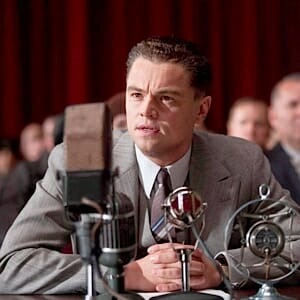
Screenwriter Dustin Lance Black follows up his Oscar-winning script for Milk, the profile of the short-lived, openly gay California politician, with a companion piece of sorts: a biopic of Milk’s polar opposite, J. Edgar Hoover, the first director of the Federal Bureau of Investigation. Hoover held the position for nearly 50 years, wielding immense power while leading an intensely closeted personal life. Under the sure direction of Clint Eastwood (at 81, as prolific as ever, helming approximately a film a year for the past decade), Black’s nonlinear script presents itself as a didactic history lesson, with Hoover (Leonardo DiCaprio, inhabiting the part, body and soul) narrating his story via the memoir he’s dictating to underlings. Where J. Edgar connects with viewers, however, is on an emotional level, charting the man’s complicated love affairs—with his mother, with his secretary, with his deputy and with his country.
The film begins near the end, as Hoover attempts to secure not only his own legacy but the Bureau’s reputation by telling his side of the story, a tale rife with heroism and villainy, patriotism and paranoia. Through fluid flashbacks, he recalls his entrée into crime-fighting with the Bolshevik invasion in 1919, his appointment to director of the Bureau of Investigation, the gangster wars of the 1930s, his thorough files on subversive threats real and perceived, his development of a centralized fingerprint database, and his misunderstanding and underestimation of the Civil Rights Movement. Eastwood doesn’t pander to his audience with subtitles explaining where and when each scene takes place, but it can cause confusion until one falls into the rhythm of the narrative.
Aiding the transitions, of course, is the transformation of DiCaprio from a young, virile man in his mid-20s to an old, declining man in his 70s, a conversion that called for dark contacts and facial prosthetics even when the actor was playing close to his age. Overseen by Sian Grigg, this process, albeit not seamless, combined with DiCaprio’s disappearance into the role, allows for the suspension of disbelief.
The script likewise faced the challenge of summarizing 50-plus years of Hoover’s professional life into 137 minutes. J. Edgar necessarily abbreviates and condenses events, focusing on key cases, particularly the Lindbergh baby kidnapping, while alluding to swaths of pervasive behavior, including his Counter Intelligence Program, without exploring it to any depth. On the one hand, the Lindbergh incident is a keen representation of Hoover’s influence on the development of law enforcement: Through it, J. Edgar demonstrates his pioneering efforts in the field of forensics and his opportunistic leverage of public sentiment to expand the power of his agency (as well as his obsession with celebrity). But the prevalence of the Lindbergh investigation in the screenplay perhaps skews its importance in the scope of the man’s career. By contrast, the three wars that took place during his reign (for that’s what it was) are hardly mentioned, and the Kennedy assassination, the investigation into which he handled personally, is encapsulated in a phone call.
Eastwood and Black do plumb the depths of Hoover’s relationships, however, beginning with his overbearing mother Annie (Judi Dench), with whom he lived until her death when he was 43. As portrayed in the film, it was her ambition that drove her son and her bigotry that closeted him—perhaps only an actress of Dench’s ability could so compellingly portray a woman who could domineer one of the most powerful men in the history of the United States. The other woman in Hoover’s life is Helen Gandy (Naomi Watts), his executive assistant for 54 years. She was as driven and focused as her boss, turning down his ill-conceived marriage proposal to work for him instead, and Watts portrays her as poised, discrete and loyal to the end.
Hoover’s great love, though, perhaps—due to the times, due to circumstance—goes unrequited. Rumors regarding his homosexuality remain unsubstantiated today, and Eastwood handles the matter sensitively, depicting a close, at times even passionate relationship between Hoover and his second-in-command, Clyde Tolson (played by Armie Hammer with self-possession and dignity), with whom he dines every day and goes on vacation. Although unconsummated on-screen, theirs is a bond built on trust, the quality Hoover valued above all others, and the subtext of their scenes is what moves the viewer most.
Though just as memorable as the key relationships it depicts, J. Edgar’s style contrasts sharply with its core passions. With deep shadows, steep camera angles and a stark color palette that suggests black and white, Eastwood employs visual elements that recall the gangster films Hoover so reviled—except, of course, when G-Men were the heroes.